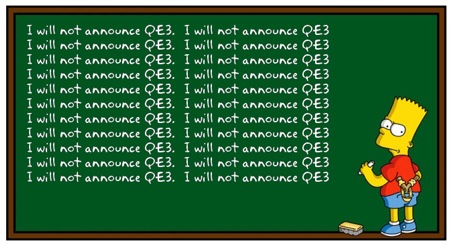Bernanke's Jelly Donut Policy
"What once looked like a purchasing spree of unimaginable proportions is now just the Fed's monthly budget."
Runs 1 minute. Summary of Einhorn's remarks from CNBC's Kate Kelly. Einhorn who manages almost $8 billion at his fund Greenlight Capital, spoke yesterday at the Buttonwood Investment Conference.
---
David Einhorn Quotes
"We would be way better off if we did pretty much the opposite of the current monetary policy."
"When the next recession comes, it is very likely we will enter it prior to the Fed having 'normalized' monetary policy, and we'll have a large fiscal deficit to boot. If the Fed is willing to deploy this new set of desperate measures in these frustrating, but non-desperate times, what will it do then?"
Einhorn said allocating a large part of a portfolio to gold still seemed like a "a very good idea."
Besides Bernanke, central bankers in Japan, the United Kingdom and the European Union have been on a "money printing spree" Einhorn said.
"While the ink may be endless, the market's tolerance is not (though there is no sign that is nearly exhausted)."
"I'm alarmed by what I consider to be the reflexive group-think of the leaders, which is, if we want a stronger economy we have to accommodate with lower rates and more QE."
"A Jelly Donut (QE) is a yummy mid-afternoon energy boost. Two Jelly Donuts are an indulgent breakfast. Three Jelly Donuts may induce a tummy ache. Six Jelly Donuts -- that's an eating disorder. Twelve Jelly Donuts is fraternity pledge hazing."
"Lower rates drive up the cost of commodities: oil and food. And money that is spent on oil is sent out of the country to the Mideast and it doesn't help, and takes out income from people's pockets that could otherwise be spent on other goods. The second is that not being able to earn a safe return on savings, is causing people to hoard savings rather than consume. In other words if I know I am going to earn 3% in the bank I can spend that income and I can have visibility towards that, but if I know I'm going to earn zero in the bank, in order to figure out how much I need to save for retirement I need to save a much bigger number. Which means I can't spend much now, I need to save more now, to build up those savings for retirement. If I am already retired and I am on fixed income, my income has now really gone down and I have to hoard money so I can spread it out thinner over a longer part of my life. So by denying individuals savings or interest on income on their savings, it is causing hoarding which is driving down consumption which is hurting the economy."
***
Buttonwood Conference Video:
Start watching at the 56-minute mark.
Einhorn wrote this sharp op-ed in May: The Fed's Jelly Donut Policy
